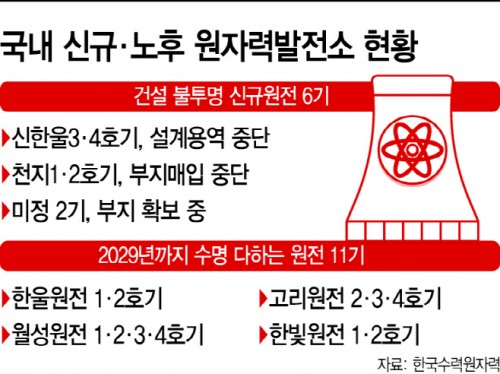 |
By AsiaToday reporter Choi Won-young
South Korea's President Moon Jae-in said the government will continue its existing nuclear phase-out policy according to the plan, sparking opposition from the nuclear power industry. It's because the government clarified its intention to continue to phase out nuclear-generated electricity while many believed that Moon's administration would partially revise its nuclear phase-out policy after a public opinion survey found a majority in favor of resuming the stalled construction of two reactors - Shin Kori-5 and Shin Kori-6.
Moon said on Sunday that he will continue with his nuclear phase-out policy, including stopping plans for the construction of new nuclear reactors. As a result, a direction for the 6 new and 11 old nuclear reactors, which will be announced by the government on Tuesday through its "Nuclear Phase-Out Roadmap", has been outlined. Although Moon said that the government will resume the construction of two nuclear reactors as recommended by the deliberation committee, he reiterated his nuclear phase-out plan, saying, "We will completely stop all plans for the construction of new nuclear reactors, and will shut down the Wolsong-1 once the government confirms stability in energy supplies."
The new nuclear power plants include Cheonji-1 and Cheonji-2 in Yeongdeok of Gyeongbuk, Shin Hanul-3 and Shin Hanul-4 in Wooljin of Gyeongbuk, and two more reactors whose names and sites are not decided yet. The government has already cancelled the design service for Shin Hanul-3 and Shin Hanul-4 in May, and stopped the environmental impact assessment service and site purchase for Cheonji-1 and Cheonji-2 in June.
Wolsong-1, which is currently in operation by extending its life span, and other 10 aged nuclear reactors, whose life span will expire in 2029, are expected to be shut down earlier than scheduled. Apart from Wolsong-1, the aged nuclear reactors are Kori-2, Kori-3, Kori-4, Hanbit-1. Hanbit-2, Hanul-1, Hanul-2, Wolsong-2, Wolsong-3, and Wolsong-4. The first reactor to be expired is Kori-2, whose lifespan expires in August 2023. Although the reactors' lifespan will expire after President Moon's term ends, the government plans to include a measure not to permit the extension of the reactors' lifespan through the 8th Power Supply and Demand Basic Plan (2017-2031) at the end of the year.
In the nuclear-related industry, there is a voice saying that the government should have asked the public's opinion about cancelling new reactor construction, since the government pushed ahead with its nuclear phase-out policy after the public decided to resume the construction of Shin Kori-5 and Shin Kori-6. An official of the nuclear power industry said, "He needs to check his nuclear phase-out policy if he understands what the public think about the two reactors. It's a problem to press on with his nuclear phase-out policy while emphasizing the deliberate democracy."
Concerns are also voiced about Moon's coal phase-out policy, which is expected to accelerate after the nuclear phase-out. The government is pushing for the conversion of four coal-fired power plants to liquefied natural gas (LNG). While the government claims that it will not negotiate aggressively with the related companies, the companies are feeling the burden on their shoulders.
An official in the power generation industry said, "The government is delaying the licensing, so it can be seen that the government is pushing ahead with its goal."
#Moon Jae-in #nuclear phase-out policy #reactors #South Korea
Copyright by Asiatoday
Most Read
-
1
-
2
-
3
-
4
-
5
-
6
-
7





















